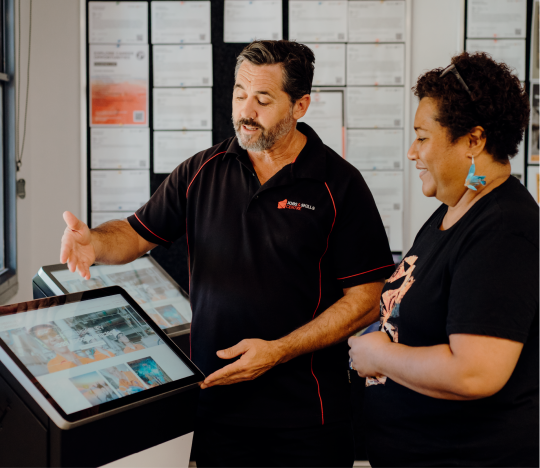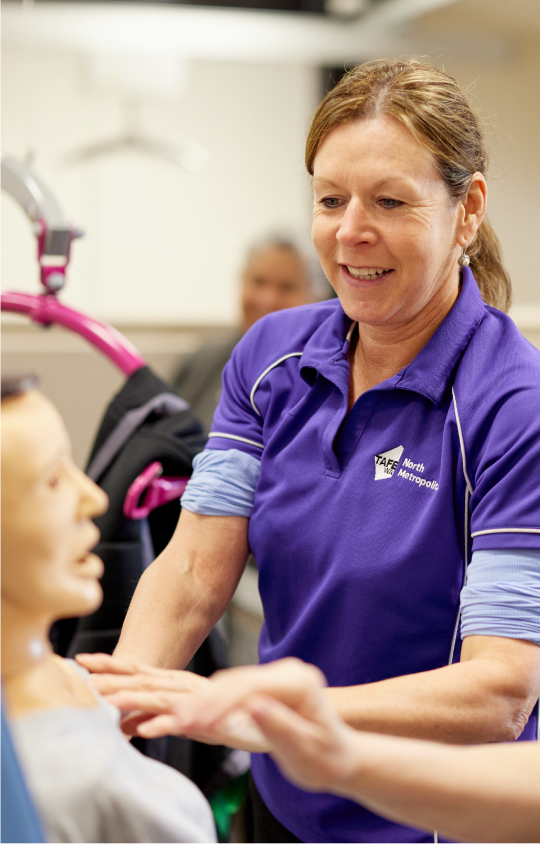Whether you're looking for a job, thinking about a career change, or upskilling for your own development now's the time to get skills ready! You can choose a full qualification with course fees reduced by half or more, or a wide range of free short course Job Ready skill sets — to get you job ready. In 2024, selected qualifications and all Job Ready skill sets will continue to be fee free for everyone*! Select one of the options below to find out more.
 |
 |
 |
|---|

FEE FREE TRAINING EXTENDED INTO 2024! That's over 130 free training courses!All Job Ready short course skill sets will continue to be fully fee-free, and selected full qualifications will remain 100% course fee-free through 2024! That's over 130 free training courses! This free training will focus on priority industry areas to help build WA's skilled workforce, support our employers and businesses, and create employment and career opportunities for all Western Australians. Please note that some eligibility criteria apply for free training, and other fees may apply for the free qualifications. Existing worker traineeships (EWTs) are not eligible for the fee-free arrangements. Please see our FAQs for details. |
Free advice, assistance and information
Located across Perth and regional WA, Jobs and Skills Centres offer a range of specialist services and support for everything training, careers and jobs,
If you would like some help to choose the best training option, course or qualification to suit your goals, your local Jobs and Skills Centre can help.
All ages are welcome, and all services are 100% free!
JSCs are located across Perth and throughout regional WA. Call your local JSC on 13 64 64, or follow the link to find your nearest centre and drop in for a chat about how we can help.

FEE FREE training extended into 2024!
That's right... free training! We are serious when we say we want to help you get skills ready!
We worked closely with WA industries, businesses and employers to find the skills needed right now and for future jobs, and made over 130 full qualifications and Job Ready short course skill sets FREE!
Not all jobs need a full qualification, and maybe you don't either — our Job Ready short course skill sets are the perfect solution to get you skills ready for your first job, or your next career move, and they're free! These skill sets contain units from nationally recognised vocational training, so they also offer you a great pathway to more skills and knowledge — the units you complete in your skill set will count towards a full qualification if you choose to go on to further study.
Or if you want to get fully qualified, we can help you there too with a range of full qualifications that are 100% course fee-free!
|
FEE FREE TRAINING WILL REMAIN IN 2024!
|
*Please refer to our FAQs for full details about eligibility for free training
Reduced course fees — Lower fees, local skills!
How would you like to get a nationally recognised and accredited qualification but pay only half-price course fees? Or even less than half price! And how about a fees cap? From tourism and hospitality to civil construction, dental assisting to commercial cookery, aged care to engineering, agriculture to cyber security, electrical to heavy vehicle mechanical technology — to name just a few — there really is something here for everyone under the Lower fees, local skills program, and these qualifications are matched up with the skills employers are looking for, so you'll be job ready!
|
There's a range of Lower fees, local skills qualifications with course fees* reduced by half or more, some by up to 72 per cent! These reduced fees courses are available at WA TAFE colleges, and selected private training providers. |
*Other fees may apply, for some qualifications. Please see our FAQs for full details.
What's better than reduced course fees? How about a fees cap!
An annual fees cap applies for course fees on all of the Lower fees, local skills qualifications. This means that regardless of how much your course fees actually are, you will not pay more than a set total amount for course fees per qualification or course per calendar year. The course fees cap is set at $400 for eligible concession students, and $1,200 for non-concession students.
Please note that only course fees are reduced and included in the fees cap; other fees may apply for some of these Lower fees, local skills courses.
*Check our FAQs for more information and eligibility details
Find a free skill set or qualificationIn the course list below, select FEE FREE from the Skills Ready filter to see all of the Job Ready skill sets and full qualifications that will continue to be free in 2024. |
 |
Find a reduced-fee qualificationIn the course list below, select Half price from the Skills Ready filter to show the qualifications that have course fees reduced by half or more and where the annual fees cap applies. |
You can use the other search filters if you would like to look at courses in a specific industry or study area, different qualification levels, or other courses. See something you like? Use the star to add it to your favourites list, or select the course title for more details.
Occupations — Finding your fit
If you want to get skills ready so you can get a job, it's helpful to know about different occupations and the kind of work they involve.
What will be a good fit with who you are and what you want for your future, and what skills do you need to get into a particular occupation or job?
To help you find your fit, we have over 550 occupation profiles you can browse through — use the keyword search below, or visit our Occupation profiles page for other options including an A—Z list.
You can also take a look at our Get that job! page, for great tips and information to help with your job search and decision making.
Please note that COVID-19 has impacted many occupations, and some of the information provided in the profiles may not reflect this.
Frequently asked questions
Here we have provided answers to some frequently asked questions about the free training and reduced-fee courses.
Please note that only general information is provided here — we recommend speaking directly to your TAFE or training provider if you require further details.
Your local Jobs and Skills Centre can assist with free advice and information about choosing the right option to get you skills ready — call them on 13 64 64 or find your local JSC and visit in person.
General questions: Free and reduced-fee training courses
Yes. Skill sets are completely free*.
Full qualifications have no course fee*, but may have a resource fee, for example to cover the cost of workshop materials or workbooks. Skill sets have no course fee and no resource fee!
*Some eligibility conditions apply for the free training. Please refer to the information below under Who can access subsidised training such as the free or reduced-fee qualifications?
Job Ready skill sets are 100% fee-free for everyone*.
*Please note: Some eligibility conditions apply for the free training. Please refer to the information under Who can access subsidised training such as the free or reduced-fee qualifications?
The Department of Training and Workforce Development’s VET Fees and charges policy- external site outlines eligibility for subsidised training in WA.
All enquiries regarding eligibility, course and resource fees should be made to the TAFE college or private training provider.
This will depend on the qualification or course that you chose.
Free Job Ready skill sets
All of the Job Ready skill sets are 100% FEE-FREE for all eligible * students.
You will pay no course fees, resource fees, or any other fees on the fee free list for job ready skill sets
Free qualifications
Full qualifications have no course fee, but may have a resource fee.
Lower fees, local skills qualifications
Lower fees, local skills full qualifications have reduced price course fees and may have some resource fees.
What are resource fees?
Resource fees cover materials purchased by the TAFE or training provider that are required for and used during your training; such as workshop materials, workbooks and essential uniforms. For example; you may need to use timber for a course in carpentry — you would pay a resource fee to cover this cost.
*Please note: Some eligibility conditions apply for the free and/or subsidised training. Please refer to the information under Who can access subsidised training such as the free or reduced-fee qualifications?
The Department of Training and Workforce Development’s VET Fees and charges policy outlines eligibility for subsidised training in WA.
All enquiries regarding fees should be made to the TAFE college or private training provider.
The WA State Government, through Jobs and Skills WA, subsidises vocational education and training (VET) courses in priority areas, to reduce or remove the fees and make training more accessible to all Western Australians.
To be eligible for free training, reduced-fee qualifications or a subsidised training place; you must have left school*, have your primary place of residence in Western Australia, and are either:
- an Australian citizen; or
- a permanent visa holder; or
- holders of a sub-class 309, 444, 785, 790, or 820 visa ; or
- secondary holders of a temporary visa of sub-class 457 or 482 visa; or
- a bridging visa E holder (subclasses 050 and 051) who has made a valid application for a visa subclass 785 or 790;
- Ukraine citizens who are holders of a visa subclass 449 or 786;
- Afghan citizens who are holders of a visa sub-class 449; or
- Holders of a bridging visa who are eligible to work and who have made a valid application for a subclass 866.
- a dependent or spouse of the primary holder of a visa subclass 457
- a bridging visa holder who has made a valid application for a visa subclass 866; or
Year 12 school students who are leaving school can access a subsidised training place from 23 October 2023.
First Nations people, young people, people out of work or receiving income support, unpaid carers, people with disability, and women facing economic insecurity are particularly encouraged to take advantage of this opportunity for fee free training.
Please note that existing worker trainees are not eligible for the fee-free arrangements.
The Department of Training and Workforce Development’s VET Fees and charges policy- external site outlines eligibility for subsidised training in WA.
All enquiries regarding eligibility and/or course fees should be made to the TAFE college or private training provider.
Yes — the free training courses and Lower fees, local skills qualifications are available at Western Australian TAFE colleges, and some are also available from selected approved private training providers.
The Skills Ready course list includes information about which TAFE colleges and private training providers are offering free training and Lower fees, local skills qualifications. Please note that availability for some courses may be subject to an available training place.
Your local Jobs and Skills Centre can help you choose a training provider. For further information on approved providers, see Choosing a training provider on this website, or call your local Jobs and Skills Centre on 13 64 64.
Once you have decided on a qualification or skill set and found a training provider that meets your needs, the next step is to apply and/or enrol.
For the Job Ready skill sets at TAFE colleges, you can enrol directly on their website. Please use our course search, then follow the 'Find out more' link on the course page for full details of the course and the enrolment process.
For private training providers, please follow the 'Find out more' link on the course page list to go to their website where information about enrolment will be available.
For all other courses, please refer to the information in the course description for each of the training providers listed as delivering that course.
It’s a good idea to contact your TAFE college or training provider directly or check their website for any eligibility requirements you need to meet, and to get the dates and other details for enrolling. For some qualifications, you may be required to apply for a place. Each of the WA TAFE colleges provides this information on their website, as do most private training providers.
General information about applying and enrolling is available here. If you would like some advice or assistance to apply for a course, your local Jobs and Skills Centre can help.
Skill sets
The Australian Skills Quality Authority (ASQA) — the national regulator for vocational education and training (VET) — defines a skill set as follows.
"A single unit of competency or a combination of units of competency from a training package which link to a licensing or regulatory requirement, or a defined industry need."
In VET, a qualification or course is made up of a number of units of competency, and each of those units has defined learning outcomes based on the skills and knowledge it covers. A skill set is developed by choosing individual units of competency that target a specific set of skills and knowledge, to meet the needs of industry or a particular job role.
Skill sets are also used to upskill workers — for example; if cleaning staff at a hospital needed to learn about infection control, or if office workers needed to learn some management skills — in situations where a full qualification is not required.
Because skill sets are based on nationally accredited units of competency, when you successfully complete a skills set short course those units can count towards a full qualification if you decide to do further study.
A vocational education and training (VET) qualification is made up of a number of units of competency, and each of those units has defined learning outcomes based on the skills and knowledge it covers. Each unit of competency has a set number of "nominal hours" ie the indicative hours required to deliver and assess the unit.
Some people choose to complete individual units, to pick up specific skills when they need to. For example, you may work as a fitter and machinist but you want to move into plant mechanics — you could complete some units from the Certificate III in Engineering Plant Mechanic qualification to gain the skills and knowledge you need for that.
Individual units of competency are also used to develop skill sets or short courses, that target a specific skills area.
Because the skill sets are not a full qualification, you will not receive a certificate.
You will receive a Statement of Attainment that lists all of the units of competency you completed in the skill set. This statement is recognised nationally as an official record. It verifies that you have completed those units, so you can receive credit for them should you continue on to further study.
Yes! Completing a skill set is a great way to find out whether this is the industry area for you, and decide if you want to do further study and gain a full qualification.
The Job Ready skill sets contain units of competency taken from nationally recognised vocational education and training (VET) qualifications. This means they work perfectly as a pathway to further study.
Please check the information in the Job ready skill sets section of this page, where we have listed possible pathways for each of the skill sets.
The Statement of Attainment you receive on completion of a skill set verifies that you have completed those units, so you will receive credit for them should you continue on to further study.
Lower fees, local skills — Reduced fee qualifications
The Lower fees, local skills program commenced on 1 January 2020, with half price course fees to be in place for eligible courses.
A full list of all qualifications on the Lower fees, local skills program can be found here on the Lower fees, local skills course list document (select the Lower fees, local skills tab).
For the Lower fees, local skills program; new qualifications have been added at different stages.
- If you commenced units in a qualification prior to the date it was included in the program, you will pay the regular course fee rate for those units.
- If you commenced units on or after the date that a qualification was included in the program, the Lower fees, local skills fee rates and annual course fee caps will apply to those units only. For these units, you will be eligible for a refund.
A full list of all qualifications in the Lower fees, local skills program can be found here on the Lower fees, local skills course list document (select the Lower fees, local skills tab).
Should you have any queries, your TAFE college or training provider can confirm the date your course was included in the Lower fees, local skills program.
If you think you may have overpaid for your Lower fees, local skills course, please contact your TAFE college or training provider to request an adjustment to your invoice and a refund of the difference.
The "annual fees cap" means that regardless of how much your annual course fees actually are, under Lower fees, local skills you will not pay more than the capped amount. There are two course fee caps, which one you pay depends on whether you are entitled to receive a concession rate or are aged at least 15 years of age but have not reached the end of the year in which you turn 25.
- The concession rate annual course fee cap for Lower fees, local skills qualifications is $400, from the date the new fee applied.
- The non-concession rate annual course fee cap for Lower fees, local skills qualifications is $1,200, from the date the new fee applied.
A full list of all qualifications on the Lower fees, local skills program can be found here on the Lower fees, local skills course list document (select the Lower fees, local skills tab). Please check with your TAFE college or training provider for details.
- The concession rate course fee cap for Lower fees, local skills qualifications is $400, from the date the new fee applied.
- The non-concession rate course fee cap for Lower fees, local skills qualifications is $1,200, from the date the new fee applied.
All students aged 15—24 years of age are eligible for the annual concession fee cap of $400 per qualification/course per year on all Lower fees, local skills qualifications, from the date the new fee applied.
The following people will be entitled to a concession rate course fees cap of $400.
- Persons aged 15—24 years and have left school*
- Persons and dependents of persons in receipt of services from one of the following Commonwealth support or employment services programs:
- Workforce Australia; or
- ParentsNext
- Persons and dependents of persons receiving the Youth Allowance, AUSTUDY or ABSTUDY
- Persons and dependents of persons holding:
- a pensioner concession card or Health Care Card; or
- a Repatriation Health Benefits Card issued by the Department of Veterans' Affairs
- Dependents of persons who are inmates of a custodial institution
*In 2022, Year 12 school students who are leaving school can access a subsidised training place from 24 October 2022.
The annual course fee caps under Lower fees, local skills are applied at qualification/course level for the calendar year.
For example; if you complete two courses in one year, the course fees will be capped for each course.
Please note: Course fees are reduced for the Lower fees, local skills qualifications, however you may be required to pay other fees such as for resources that are specifically needed for your course.
Under Lower fees, local skills the $400 course fee cap applies to units of competency that are commenced by concession students, and by people aged between 15 and 24 years.
If you are turning 25 during your course, please speak to your TAFE college or training provider to check what course fees and/or price caps will apply.
Please note: Course fees are half price for the Lower fees, local skills qualifications, however you may be required to pay other fees such as for resources that are specifically needed for your course.
The Lower fees, local skills qualifications are available whether you study full time, part time or even online (where available).
Yes! Some of the Lower fees, local skills half price qualifications are available as an apprenticeship or traineeship, which means as an apprentice or trainee you or your employer would be eligible for the half price course fees and annual course fee caps.
Pre-apprenticeships and pre-traineeships courses are also available under Lower fees, local skills; to help you prepare to get an apprenticeship or traineeship.
Please note that the lower course fee rates under Lower fees, local skills and the annual course fee cap apply only to units of competency within a course or qualification that you commence from the date the new fee applied to 31 December 2025.
If your apprenticeship or traineeship is likely to go beyond 2025, please speak to your TAFE college or training provider for information on how this might affect your course fees.
Please note: In addition to course fees, you may be required to pay other fees for resources that are specifically needed for your course. Please check with your TAFE college or training provider for details.
If you re-commence units that form part of one of the Lower fees, local skills qualifications between the date the new fee applied and 31 December 2025, you will still be eligible for the half price course fee rates and fee caps.
If you have to withdraw from the course, you are entitled to a refund of the course fee and 50% of the resource fee for units that you withdraw from, before the unit withdrawal date (which is set by your TAFE college or training provider). Please check with your TAFE or training provider for information about refunds.
The Australian Government offers VET Student Loans (VSL) only for courses at Diploma or Advanced Diploma level. If your Lower fees, local skills qualification is at Diploma or Advanced Diploma level, you may be eligible for VSL.
What are VET student loans?
Eligible students can apply to get a loan to pay for their fees through the Australian Government’s VET Student Loans scheme (VSL). Under this scheme, once you’re employed and your income exceeds a set level, you start repaying the loan through the tax system. For more information contact your training provider, visit the Australian Government's VET Student Loans website or contact the student hotline on 1800 020 108.
Online courses and learning online
Learning online can be a great way to get skilled — whether your life doesn't have room for going to classes, or you like the idea of a more flexible pace of learning. And with online courses, you can get skilled from anywhere — it doesn't have to be your local TAFE, so you can choose from a wide range of courses.
You'll be provided with all the information and resources needed for your course, help to get you set up, and support when you need it. All you need is a computer, an internet connection and a comfy chair!
Doing an online course doesn't mean you'll sitting reading a screen all by yourself, with nobody to talk to and no lecturer to help you — online courses take place in a virtual classroom and can include a range of activities including discussions, online chats, journals and blogs, social media, quizzes, web quests and project activities to keep things interesting. You'll be able to interact with your classmates, and your lecturer.
Yes, some of the courses on the list can be done completely online. However some of the courses require a practical component which can't be done online, or some may be a mix of online and face to face learning. If that's the case for your course, your TAFE or training provider will tell you what's required such as whether you'll need to attend any training on campus.
You may also need to attend TAFE when it's time for an assessment of competency to get your qualification or Statement of Attainment.
Your TAFE college is following all current health advice, including physical distancing and cleaning, to ensure your safety if you need to attend training at this time.
You will need a computer that can browse the internet, and basic programs such as Microsoft Word and email to do your work. You may also need to download programs such as Zoom so that you can take part in class meetings.
If you are concerned that your computer is not suitable, please contact the TAFE college or training provider and they will be able to advise you on the exact requirements for your course.










